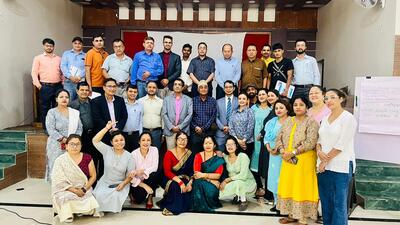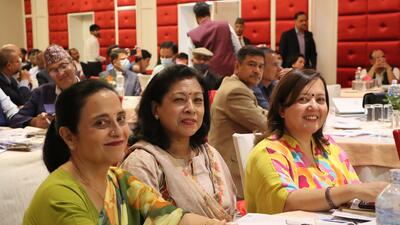
Becoming a coach on trade facilitation for the Nepali private sector
Sita Adhikari runs a business that helps Nepali exporters and importers with logistics. However, until now she didn’t know about the World Trade Organization’s Trade Facilitation Agreement that could ease her work processes.
Adhikari, who is also a member of the Nepal Freight Forwarders Association, was one of the participants of a training of trainers on raising awareness on the Trade Facilitation Agreement for the business community in Nepal, organized by the EU-Nepal Trade and Investment Programme, funded by the European Union.
“My job will become a lot easier thanks to the training,” says Adhikari. “For example, before, I didn’t know that the customs office is obligated to provide information on HS codes needed to determine the good’s tariff classification (these are codes used for various commodities in international trade). Whenever we handled a new product, it was difficult for us to determine its HS code,” said Adhikari.
Adhikari, who is now a certified trainer on the WTO Trade Facilitation Agreement, hopes to train other members of her association on the Agreement and its implementation. “I believe that the training will make life a lot easier for our members, who have so far been left out of the benefits of such a wonderful agreement that makes international trade cheaper, faster and easier,” concluded Adhikari.
The Trade Facilitation Agreement is relevant for Nepal’s exports and importers
Exporters and importers worldwide face a host of problems such as lengthy, redundant and outdated border formalities and procedures in international trade. That is why the World Trade Organization’s Members negotiated this landmark multilateral agreement, which officially entered into force on 22 February 2017, and was ratified by Nepal on 24 January 2017.
However, in Nepal, for instance, professionals involved in various trade-related activities are not aware of the provisions of the agreement. This is why the EU-Nepal Trade and Investment Programme has coached potential trainers to understand the Agreement’s provisions and benefits and share this knowledge with the business community across the country.
The four-day, in-person training followed a previous virtual training for members of the private sector that took place in the summer.
About the project
EU-Nepal TIP aims to contribute to Nepal's sustainable, inclusive economic growth and poverty reduction by increasing trade and participation in regional and global value chains.
The project aims at enhancing the capacities of the country's Ministry of Industry, Commerce and Supplies and the Trade and Export Promotion Centre to formulate trade policies, negotiate trade agreements and implement them effectively. The project provides assistance to the sustainable and inclusive development of Nepal's coffee and pashmina value chains, focusing on export development.















